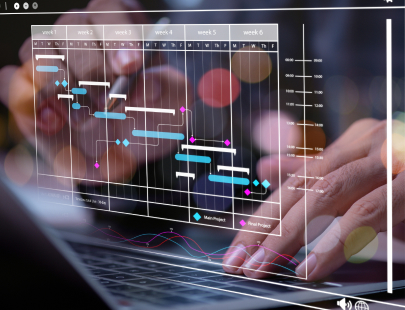Private equity (PE) has long been a domain characterized by intensive manual work, fragmented data sources, and high-stakes decisions. From fundraising and deal origination to due diligence, portfolio monitoring, and compliance reporting, the workflows in PE are intricate and often burdened by inefficiencies. However, the landscape is rapidly changing due to evolving private equity industry trends in 2025.
At the heart of this transformation is automation, specifically the application of advanced technologies such as artificial intelligence (AI), machine learning (ML), process automation, blockchain, and RegTech. These tools are streamlining how private equity firms operate, manage data, ensure compliance, and make investment decisions, ushering in a wave of private equity automation trends. By integrating automation into daily operations, PE firms can reduce errors, accelerate execution, and improve overall transparency and responsiveness.
A particularly high-impact area is compliance automation. With growing regulatory scrutiny and increasing expectations from limited partners (LPs), firms must not only meet complex compliance requirements but also do so in a timely and auditable manner. Automated systems offer a scalable, consistent, and auditable way to manage this burden, helping firms avoid fines, safeguard reputations, and maintain LP confidence.
This article explores how compliance automation and broader PE digital transformation efforts are reshaping the industry. We will examine key technologies driving this shift, spotlight real-world applications, and analyze the benefits, challenges, and future outlook for PE professionals navigating this digital transition.

Artificial intelligence (AI) and machine learning (ML) are no longer just experimental tools. Today, they can be embedded across the private equity lifecycle. Deal teams now rely on AI to accelerate tasks such as screening confidential information memoranda (CIMs), analyzing call transcripts for red flags, and drafting IC memos. Natural language processing (NLP) can extract strategic insights from investor conversations or diligence documents, reducing manual review time.
This shift is a central component of intelligent automation in PE, replacing repetitive tasks with dynamic decision support.

The most transformative shift is the use of predictive models to forecast deal outcomes. These models assess historical deal data, including MOIC, DPI, and IRR trends, to identify high-probability investments. Tools like Kairos’s Opportunity Sourcing Agent go further by scoring deals against a fund’s thesis using dynamic data filters, boosting both speed and strategic alignment.

AI systems now synthesize years of M&A and portfolio performance data to anticipate value-creation potential. For instance, a platform may flag a SaaS target with EBITDA margins and retention metrics that correlate with past top-quartile outcomes.

Blockchain technology is quietly revolutionizing private equity operations by introducing transparency, immutability, and automation into previously opaque processes. From smart contracts that trigger automated capital calls and investor notifications to encrypted compliance logs, blockchain lays the groundwork for trust without manual validation.
This is a core innovation within blockchain in PE, allowing secure and auditable transaction layers across fund operations.
One of the most promising trends is the tokenization of private assets. By converting fund interests or portfolio holdings into digital tokens, firms can streamline ownership transfers and open new pathways for secondary liquidity. Tokenization also supports fractional ownership, which was once a logistical barrier in private markets.
This aligns with evolving private market trends that emphasize transparency, fractional access, and asset flexibility.
Forward-thinking firms are deploying blockchain-based LP dashboards. These systems provide limited partners with real-time access to NAV updates, fee disclosures, and audit trails that are delivered through a secure, immutable ledger. The result: greater confidence and fewer back-and-forths during reporting cycles.
Process Automation is transforming how private equity firms handle repetitive, rules-based tasks. From investor onboarding and KYC checks to document processing and NAV updates, process automation bots now execute back-office functions that once consumed hours of manual effort, without compromising accuracy.
This pillar of operational innovation in PE gives firms a faster and more reliable backbone for internal processes.

The next evolution is intelligent automation, combining process automation with AI to build workflows that are both automated and adaptive. For example, AI-enhanced process automation systems can detect anomalies in Form PF filings, trigger conditional alerts in FATCA compliance, or personalize capital call notices based on LP profiles and engagement history.
Platforms like Kairos automate fund compliance reporting by integrating with fund admin systems, CRM tools, and market data providers. This orchestration minimizes fragmentation, speeds up filing cycles, and ensures that audit trails are always up to date, strengthening RegTech private equity capabilities within private equity.
In a market where alpha is often found in operational execution, data analytics has become indispensable for private equity firms. Advanced platforms now track key metrics, like EBITDA growth, leverage ratios, and value-creation KPIs, across all portfolio companies. These insights guide not just monitoring but active portfolio steering.
Static reports are giving way to dynamic dashboards. PE firms are increasingly adopting real-time analytics tools that surface anomalies before they escalate, such as working capital inefficiencies, missed revenue milestones, or early signs of EBITDA erosion. This shift enables faster, data-driven interventions, and is key to the future of PE automation.
Kairos runs automated scenario stress tests (e.g., FX shocks, interest rate spikes) and flags underperformance based on historical trends. Teams can track MOIC and DPI in real time, aligned with fund targets, transforming performance management from retrospective to predictive.
In private equity, where cross-functional teams navigate complex workflows across geographies, cloud infrastructure has become mission-critical. Cloud platforms unify disparate systems, including fund admin, CRM, portfolio monitoring, and compliance, into a single, secure environment. This integration not only reduces friction but enables faster, smarter decisions, aligning with key private equity industry trends in 2025.

Firms are increasingly embracing cloud-native platforms that are purpose-built for private capital. Kairos centralizes deal pipelines, making it easier to manage diligence workflows, track IC memos, and coordinate across BD, investment, and legal teams from anywhere in the world.
Kairos offers secure, role-based access to sensitive data, ensuring that deal teams, finance, and IR have the right visibility without compromising confidentiality. Integrated document vaults, collaboration workspaces, and audit logs streamline everything from diligence to LP reporting.
Private equity firms are embracing automation to strengthen their risk management frameworks. Traditionally reliant on periodic reviews and human judgment, risk assessment is now increasingly augmented by AI-driven tools that provide continuous monitoring and real-time alerts.
The trend is clear: firms are adopting autonomous risk models capable of predicting financial, operational, and regulatory exposures. Machine learning algorithms sift through historical data to identify patterns that precede compliance breaches or value erosion, flagging potential issues before they escalate.
Kairos empowers deal and portfolio teams to conduct automated scenario analysis at scale, evaluating how a company might perform under macroeconomic shocks, regulatory changes, or geopolitical instability. IC memos can now be generated with embedded risk assessments that draw on live data feeds and historical benchmarks.
Automation doesn’t come without friction, despite the promise. High implementation costs, particularly for mid-market PE firms, and integration challenges with legacy systems can hinder adoption.

Automated systems process vast amounts of sensitive information. Without robust data governance and enterprise-grade security protocols, firms expose themselves to compliance and reputational risks.

Successful automation demands more than just tools. It requires cultural alignment and capability building. Professionals must be trained to interpret outputs, manage exceptions, and oversee automated workflows with a critical eye.

No matter how sophisticated the platform, human judgment is essential, especially in high-stakes decisions like deal evaluations, regulatory interpretations, and LP negotiations. Automation should enhance, not replace, the expertise that defines private equity.

Over the next decade, automation in private equity will evolve from reactive task execution to predictive and autonomous decision support. AI agents will not just flag risks. Instead, they will anticipate them, helping firms stay ahead of regulatory scrutiny and operational disruptions. This shift will define the future of private equity by empowering firms to proactively manage compliance and portfolio risks.
Emerging technologies like quantum computing and generative AI will push the boundaries of what’s possible. Quantum models promise to solve complex financial optimizations at unprecedented speed, while generative AI could reshape everything from scenario planning to deal structuring.
Firms that invest early in the future of PE automation with scalable, PE-native platforms, will gain a sustained edge: faster deal execution, tighter compliance, cleaner audits, and deeper LP trust. In a market where speed and precision define returns, automation will be the new competitive moat.
Private equity is undergoing a quiet revolution that is driven not just by capital, but by code. The integration of AI/ML, blockchain, process automation, data analytics, cloud platforms, and RegTech is redefining how firms source deals, manage risk, engage LPs, and deliver value.
These aren’t isolated tools. They form an interconnected ecosystem that enables PE firms to operate with greater speed, precision, and accountability. The future belongs to firms that not only recognize this shift but also act on it.
Now is the time for private equity leaders to assess their automation readiness. From compliance reporting to portfolio optimization, modern platforms like Kairos offer the infrastructure to future-proof operations while enhancing performance today.
For firms that embrace this transformation, automation won’t just be a tool, it will be a strategic asset.

Explore how Brownloop can help your firm lead the next era of smarter, faster, and more
transparent
private equity.
Cloud platforms centralize fund admin, CRM, and compliance data, enabling secure collaboration and real-time access. They reduce friction across teams, improve version control, and support hybrid workflows—making PE operations more agile, scalable, and transparent.
Key technologies include AI in private equity for predictive analytics, blockchain for transparency and cloud infrastructure for collaboration. Emerging frontiers like quantum computing and generative AI are poised to redefine modeling, scenario planning, and regulatory forecasting in the next decade.
No. Automation augments human expertise by handling repetitive tasks and providing data-driven insights. High-stakes decisions, like pricing, negotiations, and strategic alignment, still require judgment, intuition, and experience that machines cannot replicate.
Start with high-impact areas such as LP reporting, compliance workflows, or portfolio monitoring. Choose platforms like Kairos that are built for private equity workflows, support modular deployment, and offer seamless integration with existing systems.
Firms often face high setup costs, legacy system integration issues, and change management hurdles. Ensuring data integrity, user training, and maintaining human oversight are also critical to realizing the full value of automation investments. Successful adoption of PE trends also requires upskilling teams and enforcing data hygiene protocols.
Invest in scalable, domain-specific platforms. Standardize data models, upskill teams in AI literacy, and align technology with fund strategy. Embracing automation proactively will ensure resilience, agility, and long-term competitive advantage.